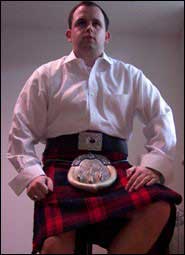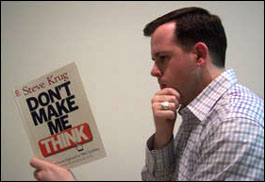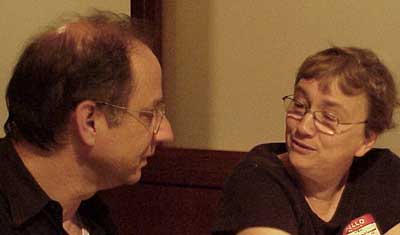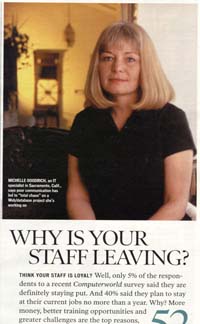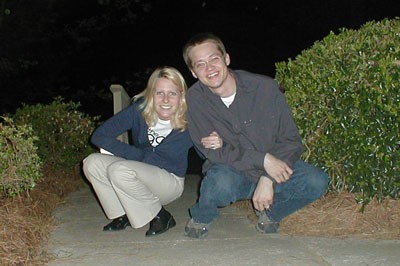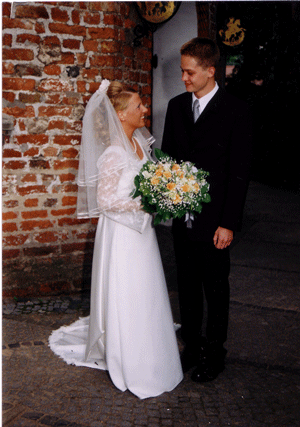Sandhill Trek Presents…the Avuncular Chris
Sandhill Trek Presents…
the Avuncular Chris Locke
Chris Locke is the author of Gonzo Marketing: Winning through Worst Practices, The Bombast Transcripts, and a co-author of The Cluetrain Manifesto: the End of Business as Usual. He is a gentle person with a piercing vision. Talking with Chris one is aware of one’s own contradictions: the thousand hypocrisies and social compromises that get in the way of honest communication. Chris has published his Entropy Gradient Reversals webzine on the net for ten years or so, via email to an ever more refined list of subscribers. Every issue, Chris lets you know that if you don’t like EGR, then you should damn well unsubscribe. Every issue a few people do. But the subscriber list keeps growing.
In the fall of 2001, Chris encouraged a lot of us to get out there with our writing, to blog… then the dirty JapaNazi Arab scumsucker terrorist ratfuckers blew up the east coast of the US mainland and blogging took a right turn into political rappage and a lot of ground was lost. Nevertheless, Chris has been there warmly encouraging any who approach him… his own outspoken honesty, on a cultural and personal level stands as a model to the hundreds of bloggers that drop by his blog just to see what dirty old Uncle Rage has been up to today.
About the time I started noodging him for an interview a year or more ago he went into a long dry spell. But I was relentless, and I ignored his personal pain and I hassled him every chance I got and finally… with the following e-mail exchange, the interview began:
From: Frank Paynter [mailto:[email protected]]
Sent: Saturday, July 19, 2026 5:49 PM
To: [email protected]
Subject: A good reason for an interview
Two or three good reasons really, Chris. I am not a world class foolish personality like RU Sirius, nor do I have the digitized luxury of special sound recording equipment with audio blogging componentry like Chris Lydon, but I am so fucking brilliant and such a driving force in technology, pop culture, and coffee roasting that I am almost sure you will enjoy the experience.
p.s.
A number of us have agreed to go together and get you the concrete vibrator as shower gift.
From: Christopher Locke [mailto:[email protected]]
Sent: < ?xml:namespace prefix = st1 ns = "urn:schemas-microsoft-com:office:smarttags" />
To: ‘Frank Paynter’
Subject: RE: A good reason for an interview
OK. for your sheer perseverance and good humor in the face of multiple rebuttals (my butt in your face), I will do the goddam interview.
with no stipulations or conditions. fuck it. < ?xml:namespace prefix = o ns = "urn:schemas-microsoft-com:office:office" />
so fire away.
chris
I fired away:
Donald Barthelme once said, “Those who never attempt the absurd never achieve the impossible.” Have you ever attempted the absurd? Have you ever achieved the impossible?
Donald Barthelme. Sigh. So it’s gonna be like that, is it? Well OK, I give up. All the fight’s gone out of me. Sure, Donald Barthelme, why not? I should be grateful, I guess, that it’s not Nabokov. Or Joyce Carol Oates. You major in English or something?
Yes, I majored in English. It was the lazy thing to do and it left most of my time free for sex, drugs, and loud-loud music. I didn’t tumble to the English major thing until later though. I wasted a good deal of undergraduate beer time actually studying and before I changed majors I had most of an Economics degree under my belt. Peering down and trying to see my pecker when I pee, it still seems to be there… under my belt, I mean… but I digress.
You are seriously fucked up, Frank. You know that? I feel as if I’m attempting the absurd right now. Donald Barthelme. Jesus.
Less surreally (perhaps), I think starting EGR while I was on the IBM payroll had a touch of the absurd to it. Not to mention the desperate. And that it caught on — inasmuch as it did — has always struck me as semblance of achieving the impossible. It certainly got me to where I am today. Which is to say, broke, depressed, and near-suicidal. But despite these gains, I try to remain modest. I’ve never been one to let insolvency or mental illness go to my head.
Do you prefer the laundry detergent pellets, or liquid, or are you an old fashioned powder or flake man?
I go with the liquid, definitely. I have a whole ritual surrounding the doing of laundry. I can’t say much about it, though, as the process entails certain practices imparted to me by a Siberian shaman, who, if he found out I’d divulged these things in a public forum, especially to The Unclean, such as yourself, well… let’s just say there could be certain nasty repercussions. [ed. note… we have tried to communicate with Enkhtaivan-zairan, the only Siberian shaman we could dig up on short notice, but he is away… presumably on an out of body excursion communicating with the 33 great Hankhouhii Mountain Spirits so no one was available to authenticate Mr. Locke’s claim].
I think I can say (…wait, let me throw the I Ching… OK, I guess it’s all right) that I generally prefer Cheer Free. Lately, however, I’ve been reduced to using a generic, and I must say I miss getting those whiter whites. The cheap stuff doesn’t do much for cum stains, either, so this is getting to be a real problem. It wouldn’t be so bad if we were talking just my underwear. But we’re not. I used to be able to just pop the drapes in the washing machine. But maybe we’re getting a bit off-course here. [ed. note: in an offline conversation some obscure reference to Gargantua and the traditional dearth of two ply tissues on the European continent was tied in to this strange discussion of Mr. Locke’s drapes. We leave that thought where we found it].
I read your blog so I have a sense you�ve been doing some sociology research lately, a study of new age bullshit. Meanwhile, on the fictive front, Tom Robbins has published Villa Incognito. It begins with the story of Tanuki, a magical racoon-like dog with shape-shifting powers (that happens to be the modern-day god of gluttony, boozing, and restauranteurs).
Do you have any of the Trickster�s blood in your veins? If so, what strain do you think?
Coyote, of course. Maybe it’s my proximity to the American Southwest, or maybe it was always there. Hard to say. Maybe I’ve been possessed and RageBoy really is Coyote. But Coyote is smart, so your mileage may vary on that one. Mine does. I haven’t read (or even yet seen) the new Tom Robbins thing, so all I can say is that it sounds interesting. I haven’t read all his stuff by a long shot, but Another Roadside Attraction fundamentally changed my life.
As to the research you mention, yes, I’m in High Detective Mode at the moment. Emphasis on the High. It’s not a drug thing, no. But it is a high, involving as it does a special sort of mania to which I am definitely addicted. The rush is when unsuspected linkages begin to appear across apparently unconnected genres. For instance, I just learned that if you dig far enough down into the meaning of “self-esteem” and how that term is generally interpreted today, you find — are you ready for this? — Ayn Rand. Yes, and her “philosophy” of so-called Objectivism, which is, if I may coin a phrase, the last gasp of the Enlightenment project filtered through the most ignorant possible reading of logical positivism decoupled entirely from any notion of the erstwhile and well-lip-serviced social contract.
I guess that really isn’t a “phrase” in the usual sense, is it?
But these little epiphanies — and that one’s not so little I would argue — I will argue in the book I’m working on — result from a practice I’ve developed and refer to as “reading bookstores.” The book is tentatively titled No Love Lost. It’s about New Age “spirituality,” certain questionable kinds of associated “therapies,” and how these, especially when combined, serve to validate and encourage pathological narcissism. And how this pisses me off. Yes.
The book title has a double meaning, and as my faithful and attentive readers…
I see you use the plural there.
Yes. Well, as I was saying, as my readers know, I’m way down into double meanings. The obvious one is the way we use the common saying, as in: “There is no love lost between those two.” The not so obvious one entails a quality of life not often mentioned when people invoke “quality of life,” by which they usually mean: “Are there any Negroes living in the neighborhood?” In this case, however, the quality is what some have called “negentropy.” And this has to do, of course, with my magnum opus: the theory of entropy gradient reversal. Which is to say, things moving inexorably from a state of general chaos to a more ordered state. Of course, it is crucial how one defines the terms chaos and order, and I’ll admit that my axioms may be … how shall we say? A bit unconventional in this respect.
Also, the book title, No Love Lost, doesn’t really make reference to the laws of thermodynamics (in which entropy and its metaphorical analogs find their illocutionary force), but more the law of the conservation of energy. Thus, “no love lost” becomes a statement (of faith, at least until such time that my theory is proven) that the quantity of love in the world — if it were a quantity that could be measured; again, we’re back to metaphor — is a universal constant, neither increasing nor decreasing no matter what local permutations it is subjected to. Thus, I may hate you and love you at the same time, and one is not affected by the other. That is to say, love is not lost. Squandered perhaps, but not lost. It still circulates in some larger system, which may be either open or closed; we simply don’t know. Some early speculations on this latter issue were included in a relatively early EGR titled “Bad Science, No Pictures.”
I need to say that your characterization of this research as “sociology” rather misses the mark. I’ve read a heaping helping of post-Freudian psychoanalytic theory in the last six months or so, and am currently working my way through a mountain of New Age twaddle. Jeneane suggested that this latter has the quality of homeopathy — the hair of the dog thing — but Don (my analyst) points out that homeopathy usually means taking a small amount of some otherwise toxic substance, and that I have mounded my plate at the smorgasbord of spiritual delusion and keep going back for more. Gluttony for punishment? Perhaps. I cannot simply sweep this possibility under what passes in these parts for the cosmic rug.
To get a real flavor for what I’m up to, imagine that scene in A Beautiful Mind where the outback garage-study of our totally over-the-top psychotic hero is discovered one terrible day by his wife, festooned with newspaper and magazine articles in which he has read Hidden Significance, and hypertexted the lot with thumbtacked arcs of yarn. For me, that is the most thrilling moment in the movie. I definitely recognized an application of my own methods. The guy was Looney Tunes for sure, but remember: he did win the Nobel prize. My greatest problem, as I see it, is that there is as yet no Nobel prize for blogging.
One note on the narcissist bit. It obviously takes one to know one. I feel I’ve been blessed in this regard, though I have preferred (for Boddhisattvic reasons far beyond the scope of the present interview) to remain on the Borderline. If you were as attuned and sensitive and intelligent and empathic as me, Frank, you would immediately grasp what I’m saying here. As it is, I think you’ve got quite a bit of Bad Karma to work out. [ed. note: what-EV-er…]
Speaking of which, what did you do with those porn links I sent you? Uh-huh. See what I mean?
I liked the picture of the lady with the Dali print on her motel room wall. And that particular shade of pink is unusual, although perhaps it was a trick of the light. Thanks. Some months ago I figured that the schizoid split (is that redundant?) was complete when I heard that you were marrying RageBoy in Colorado on the summer solstice. What caused you and Mr. Boy to change your plans? I understand the wedding is now scheduled for 12/21/2003. I check the snail-mailbox everyday for an invitation.
Actually, schizophrenia does not equate, as many ignorantly suppose, to a “split personality.” The latter is Multiple Personality Disorder (MPD), or as it has been fairly recently renamed, Dissociative Identity Disorder (DID) — as in “I Know What You DID Last Summer.” So, RageBoy may be more properly thought of as an “alter.” We are not schizophrenic.
He can be, however. A subtle point for some, perhaps, but entirely true. When he flips, as most of our readers have experienced, he can be a real pain the ass. He has no morals, no integrity, no sense of propriety or tact. For instance, he’s fond of reminding people born after 1980 (which seems to be almost everyone these days) of R. Crumb’s… let’s just say, for now, less racially salutary comic strips. And there were some doozies, take my word for it. As you can imagine, this wins him no friends among the politically correct (i.e., the lily-white and liberally guilty) of Boulder, Colorado. The technical term is “psychopath,” though some of these DSM-IV diagnostic labels are a little dicey.
However you look at it, he can be, trying. I put off the wedding after he filled my shoes with creamy pickled herring one morning when I was rushing to get to the airport. You ask him why he does these things, he goes all autistic on you. I can’t tell you how tired I am of his shoe-shuffling “Wapner in eight minutes” routine. Yet I try to make allowances, knowing how emotionally abused he was as a child — forced to smoke rubber cigars, left overnight in the giraffe pen, made to dress up like an IBM salesman. These sorts of things leave an indelible imprint on a growing mind. RB is arrested at the early developmental stage known in the psychoanalytic literature as Anal Explosive.
Long story short, I forgave the demented motherfucker for the herring, and for no end of other acts unmentionable in a family publication such as this. Clearly, the ceremony had to take place on a solstice, and midwinter was simply the next one available. You’ll get your formal invitation. Probably. Keep your shirt on. Meanwhile, have you been to our Wedding Registry? Have you bought us anything? This could help your chances a lot, you know.
So there you were, pretty much in the belly of that particular beast… IBM back in the day, before the cute space cadet ads. Did you have a closet full of dark suits and dark patternless ties I wonder? Wingtips? Has anyone ever told you that the initials IBM are the numerological equivalent of 666? I wonder if you were the only guy there at the time with hair down to your ass? Well, these are idle ruminations for sure… but since you brought it up, you must have been on the IBM payroll when you first met Esther Dyson. Legend has it that it was she who first introduced [you] to RageBoy and he basically knocked your sox off with his cogent analysis of Stewart Brandship. Will Esther be in the wedding party? You think you can get the bridesmaids to wear Speedos?
I hadn’t thought of the Speedos idea. Thanks. But I see I need to set a few things straight for the Historical Record — somewhat akin to and yet crucially different from the New Age Akashic Record, invented by Madame Blavatsky. As I understand it, the Akashic Record is an intangible medium on which is imprinted (who knows how) all that has ever happened. Sort of like blogging, but more, you know, spiritual. I only mention this because I have serious doubts that the details of my Major Exploits will ever be fully recoverable from the Akasha. This concern, I hasten to say, is not fueled by egotism, but represents my compassion for the graduate students of the future who will have no choice but to research my life — what I must have been thinking in 2026 to end up the way I did in 2026; that sort of thing.
The Blavatsky thing somehow reminds me of Betsy Devine’s recent Mormon underwear post…
What-ev-er.
First of all, I didn’t have long hair when I joined IBM in 1995. In fact, I got it cut the day before I started there. However, this was the last time I got it cut. So to clarify, while it may be “down to my ass” now, as you say, it wasn’t back then. To clarify further, it is not really down to my ass, but it does reach to my… uh, navel. I’ve been told that when I let it down fully (a rarity in public), I bear a strong resemblance to the Mona Lisa.
Second of all, I met Esther fully ten years earlier, at a triple-AI conference. That’s how we said it back then: triple-AI. The full acronym, AAAI, stood for (and perhaps still does for all I know; or care) The American Association for Artificial Intelligence, the ultimate mission of whose members is to become code dependent no more. You could say. (I hereby claim copyright for that one so that Wired can’t steal it from me, as they did with BrandWidth; the plagiarizing bastards.)
So yes, Esther and I first met there in 1985. This was of course long before our much publicized affair, the details of which Doc Searls — usually able to keep a secret — divulged at the first Digital Identity conference in Denver last year. I want to go on record right here in saying that during the entire period of our intimacy (now sadly ended, but no hard feelings) she never once offered me a free subscription to Release 1.0 or invited me to speak at PC Forum. Well, maybe some hard feelings, but really very few. Esther, as I have said elsewhere, is a brick. A British expression, if you’re not familiar. Those fucking Limeys come up with the weirdest shit, don’t you think?
But I see I haven’t answered you on the issue of dark suits, tasteful neckware, and Satanic numerology. Uh. What can I tell you Frank? Yes, it’s true I never signed their non-disclosure “agreement,” but I have children, you know? Whom I wouldn’t want to see blood-sacrificed in some occult corporate group-grope, if you take my meaning. So if you don’t terribly much mind, let’s pass on to other matters, shall we?
What do pet lobsters, rhinoplasty, Occam’s Razor and bacchanalian revels in New York’s SoHo district all have in common? Are people getting stupider? And why on earth does there have to be a separate information technology discipline called Bio-fucking-informatics? Did Ellison make that up or what?
Your observations about any and all of these matters may help to realize the promise of EGR Issue #15 (and the part about “bioinformatics” I threw in there because it has been troubling me for several years now and nobody seems to know what the fuck I’m talking about.)
Ah, very nice segue. You’ve done this before, then, have you?
All that comes to mind on the lobster front is a book, now long out of print, by one Chester Anderson. Or Andersen. (Why can’t those Nordic types ever get together on this one? Change all their names to Accenture or something.) It was about these six-foot sentient purple lobsters from outer space who came to Earth because the book’s main character hallucinated them. It was really about the drug he took (or discovered; I forget now) that made whatever you hallucinated real. Sort of like Oracle, come to think of it. So yeah, who knows. Maybe there is something to your Ellison fantasy.
As to plastered rhinos, SoHo, bioinformatics…I have no earthly idea what you’re on about. Are you taking drugs? Whose ho? And are you maybe thinking bioNOMICS? I can see getting crazy about that. But isn’t bioinformatics like when they count how many people have Borderline Personality Disorder, then count the legs and divide by five? Seems harmless enough to me. Why? Because it’s DATA-based, that’s why. Because it’s SCIENCE. You aren’t questioning science, are you, Frank? Because if that were the case, this interview would be over pret-ty darn quick. We must have some sort of Standards. Otherwise, the world would quickly devolve into Total Chaos. Like the postmodernist devil worshippers say. As you know, Scott Peck has already warned us of these dangers in People of the Lie.
Actually, to come back to your question, no. Most people are not getting stupider. Fortunately for us, most people are already as stupid as they’re ever going to get. However, Scott Peck is getting stupider. I suspect it’s all part of his plan to retain his enormous AA following. If you think about it — and believe me, I have — 12-stepping is right up there with goose-stepping. I owe something to Alcoholics Anonymous, as I got sober in Tokyo by going to meetings there. But when they handed out the Nazi arm-bands and started eating babies, it was just too much for me. I’ve maintained my sobriety for nearly 20 years now by other means. They have a saying in the Program — for everything, actually — but the one I’m thinking of is HALT. It’s a mnemonic device (nothing to do with Keanu Reeves) that’s supposed to remind the newly sober “pigeon” (another lovely AA term I was ever so fond of) not to get too Hungry, too Angry, too Lonely, or too Tired. My personal instantiation of this advice was to grab a cheeseburger, kill somebody, get laid and take a nap.
So you see, there is more than one way to Be Restored to Sanity, as they say. And without all this Higher Power crap. Look at me. I’m living proof. True, I’ve had to sacrifice a certain measure of Serenity to persevere in my patent-pending Left-Hand-Path version of “clean and sober.” But so fucking what? Is that any of your goddam business?
What? Why are you looking at me like that? I’ll fucking kill you, Frank, and my heart rate won’t even budge. Just look out. OK?
OK. Next question, then.
I�ve been pawing through old copies of EGR, that fabulous webzine, and I decided to dig into the readers� comments a little bit. (It was good of you to encourage email comments then Chris. It gave us Bozos a sense of participation.) Anyway, I ran across the following:
“Your tale of woe at the hands of corporate America, lizard-booted blondes, big-ticket academic think-tanks and the mood-altering chemicals to drown them all out lessen the blow of having myself chosen the left-hand path (pissing away my best earning years…)”
Now this could have been written by moi, except I gotta ask, can you refresh my memory regarding those lizard-booted blondes please? This was the days before your recent tribulations with the NN (Notorious Narcissist) so I’m thinking the pain and suffering may have had a more, shall we say, “sexual context”?
Look, everything has a sexual context. Thinking it doesn’t is one of those “advances” in human thought brought to us by the unholy alliance long ago forged between monotheism and the mind-body “problem.” And besides, she’s not really blonde.
I don’t want to talk about it, really. As Terry Real put it ever so well. But I will say that, through extensive reading of the New Age… uh, literature, I’ve come to realize that I must finally Take Responsibility for my Own Behavior. My “pain and suffering,” as you say, were visited upon me strictly and solely by my own refusal to accept Reality. If I had wanted to, if I had truly willed it, I could have enjoyed being dumped by that two-bit street whore.
No wait. I haven’t quite gotten it down yet. Can I try this one again?
Sure. Go for it.
What I mean to say is that I understand it’s “no sin to move away,” as she told me at the end. She simply wasn’t getting her needs met. I can see that now. That I saw any fault in her protecting her boundary was merely a function of my infantile expectations of what a relationship can deliver. A genuinely adult relationship requires more. A taste for sadomasochism, for one thing.
I still don’t think I’ve said this right. But I’m working on myself, you know? Working on my issues.
HALT!
Oh, by the way, it would be good of you now to open up interactive comment space on the EGR Weblog. We, your loyal readers, would like to flood your web space with gibberish.
Yeah? Wow. You mean like a “markets are conversations” kinda thing? Imagine me going, “Fuck! I coulda had a V-8!”
What makes RageBoy so hip? How did you (RB or Chris, either one of you should be able to handle this question)… how did you get to be one of the consummate insiders in the Internet game?
Doesn’t it make you feel maybe a little shall we say SCHIZO-FUCKING-PHRENIC to be such a gifted artist and a technogogue too?
Technogogue. I like that. Yeah. Though what I don’t know about technology could populate a jumbo jet’s worth of CD-ROMs. Truth be told — and it’s all about Truth in the final analysis, isn’t it? — I don’t give a flying fuck about technology. And my 13 year old daughter delights in reminding me that anyone who says “hip” clearly isn’t. It’s like saying Frank Sinatra was a hep-cat. Gives you the shivers, doesn’t it? By the way, have I mentioned how much I despise Frank Sinatra and everything he represents? Colin Wilson has a new book out called Scandal or something close. I was reading the bit about Sinatra at my local Barnes & Noble a couple nights ago, and I was tempted to buy it solely on the strength of that one profile. Some juicy shit there.
I know this is a bit off-track, but I’m currently more interested in what Colin Wilson wrote about Abraham Maslow — he did a biography of the guy who launched Humanistic Psychology (along with Carl Rogers). New Pathways in Psychology I think it’s called. I downloaded an e-version of it several days ago, so I can search the text. I’m looking for references to self-esteem. Which was part of Maslow’s nefarious hierarchy of needs. As we all know today, these are the things one must “get met.” But what’s really curious to me, something I discovered only this week, is that Wilson also knew Nathaniel Brandon — said he would one day be revered as one of the greatest philosophers of the 20th century. Brandon is the reigning guru on the subject of self-esteem, which theory (emphasis mine) he developed in support of the so-called philosophy of Ayn Rand, whose lover he was (if you can imagine) at the time. I suspect he used his demented ravings as a kind of intellectual foreplay to get Ayn to put out. It’s all very seamy and unseemly. One expects the sudden appearance of post-horns. A lot of them. At a minimum, 49.
It’s a weird world when Pynchon starts looking like Matt Drudge, and Dr. Phil is touted as a “psychotherapist.” Why call in a thousand monkeys when 12 will turn the trick? The postmodern psychic landscape is a jungle, and I’ve merely decided to go hunting. Like Teddy Roosevelt. Like Hemingway. Mount some big taxidermied heads in my den. Over the fireplace mantel. Contemplate them over a snifter of good Cognac, perhaps. A few lines. Of Shakespeare, of Proust, of Rabelais or Cervantes. Thus, slowly, I am coming to esteem myself. My face at first just ghostly, now a whiter shade of pale.
Not sure if that answers your question, though.
No, no. That was fine as far it went, and I’m glad you didn’t get into the Rabelaisian thing about Gargantua and the neck of a fine large goose.
Halley says that masturbation lessens our chances for prostate cancer which is the only reason I ever do it, strictly a personal hygiene matter. As an older fellow I’ve noticed there is more effort for less result in this monkey spanking business. Has your research into the New Age marketplace turned up any elk earwax or similar nostrums that will assure lengthier erections and more copious discharge of what some might clinically refer to as “seminal fluids?” Or would you prefer the more euphemistic “love juice?” Or the ever evocative “giz?”
It’s “jizz” actually. More akin to the jinn than the genie. You know, Roland Barthes wrote…
Roland Barthes? Roland Barthes? And you were hassling me about Barthelme?
…Barthes wrote about the pleasure of the text in a way that made it clear he was talking about explicitly sexual joy. Jouissance in the French, though I’d have to look up the spelling. To spell a word is to cast a spell. And grammar is glamour: originally, magic. Language is a con, a conjurers game, a conjugal conjugation of spells that evoke forward memory. As the Beatles once asked: Haven’t I the right / to make it up / girl? The answer is yes. The answer is always and endlessly, until you come. And the Stones replied: I am waiting / I am waiting / all year / all year. This intertext interests me more than my prostate gland. Though I am no stranger to myself. No stranger, say, than I am to the people who read me. Between the buttons, between the lines. And in the code, a deeper code. Always and endlessly, your heart my target. Big game.
I wonder, in this age of spam, if you did find the one true aphrodisiac and sexual quality enhancer how you would get the word out? Have to blog it I guess and let word of mouth carry the message across this great globe of ours.
There is more to do with the mouth than get word out. We can take each other in. Of course blogs. The latest come-on. Since I’ve already invoked Their Satanic Majesties: we all need someone we can bleed on. The one true aphrodisiac is the heart undone. Unprotected, unbounded, unbidden. Unless and until we become afraid of what we are. Which is what we don’t know. And the pretense of knowing refuses love. Denies it. Destroys what is most precious in this life. What is this life. The unconscious is not an idea, a concept. It’s an ocean on which our lives float and ride. Unknown and unknowable. This calls for the deepest respect. Calls to something that responds to voice, the resonance and mystery of each other. I’ll show you mine if you show me yours. That’s how I get the word out. Read me, be me. Cross my threshold.
Oh.
Speaking of blogs… are there any blogs that you read with any great frequency? Whose?
Lately I haven’t been online much at all. So much of what people are writing about are current events. What happened, what might. To me, right now at any rate, these are side effects. I don’t care. I’ve been struggling this past year or so to save my mind, my life. I know that sounds terribly dramatic, but it’s true. I’m coming out of what people used to call a “nervous breakdown.” My world fell apart. It’s that simple. And I’ve been trying to rebuild it. Many bloggers have been very kind. Truly kind. I don’t think I would have made it without them. Mostly, we talk on the telephone. Mostly, they’re women. One thing I’ve discovered is that, if you ask around, most of us are hurting a lot more, and a lot worse, than we tend to let on. Men tend to let on the least. This is what interests me now. Misery loves company, it’s true. And most of us aren’t getting enough. Hyperlinks are fine, but try picking up the phone, getting on a plane. Something else happens. I’ve never had friends like this before. I’d like to thank them here.
I should say they’re not all women. Though I do have a special affinity for the fair sex. It’s good to know that some of them are fair. You could ask what’s so special about that? Ask them yourself. As yourself. This may sound easy, but it’s not. It’s something you can do better, though, when you have nothing left to hide or protect. No reputation to defend, no one but yourself to be. Terrifying and wonderful by turns. I believe we are beginning to show ourselves to each other for the first time in history. This is what interests me now. I’m working on a new set of theses quite different from the Cluetrain 95. The first one is: We die. Gives you some idea.
This morning it looks like Lydon has laid the trap for Searls and Doc fell right into it. Hah! Lazy, that’s what I’d call it. Can you imagine any reason why a writer would rather engage in a forty-five minute oral exchange and see his interview published in the same day, rather than spending weeks licking the nib of an ink pen searching for just the right turn of phrase as he carefully assembles a response to some ill chosen questions by a rank amateur who insists on email as the interlocutory device?
No? Me neither.
What can I say to that? I’m a fool for doing it, and a bigger fool not to. It has long been a guiding principle in my life, when offered the choice, to act the bigger fool. It’s just that, sometimes, it takes me a while to get warmed up. And zero Kelvin is a hell of a place to start. Like getting lost on some cosmic Iditerod, and two years later miraculously stumbling out of the frozen wastes. “What was it like?” someone asks. A lot of someones ask you. And you ask yourself: Where do you begin?
And where end? Because in the middle of the story, the main character dies. That’s me. That’s you. Understanding something of this always unexpected ending is where love begins.
Bruno Latour simplemindedly asserts that “destruction is necessary for construction.” Peter Sloterdijk says that “[o]f all offensive gestures of aesthetic modernity, surrealism, more than any other, strengthened the insight that the main interest of the present time must focus on the explication of culture - provided we understand culture as the quintessence of symbol-forming mechanisms and art creation processes.” Even the lamest box-top collecting blog interviewer can see the Dali portrait on the mouse over of your own picture on the EGR blog. So how do these insights from Latour and Sloterdijk fit with your own sense of yourself as a creative presence?
Holy shit, Frank, this is like what? Philosophy or something. Man, you really know how to be subtle. Sneak in those trick questions. Bruno Latour. All right, I’ll tell you what I know about Bruno. Every bit of it from crawling around in also-bought Amazon links. He seems to be a radical constructionist who likes to take potshots at Big Science. It’s a narrative. No, it’s a breath mint. Personally, I think it’s a breath mint and a narrative. But as Dewey says in the trailer for Scream II, “Let’s move on then.” And no, it’s not fucking pragmatism. Rorty is blurbing Dennett’s new book on Free Will. I haven’t read it, but I suspect it gets the same hatchet job he delivered to Consciousness. Lizzy Borden would be proud. Tell you what: fuck these people. It’s all pseudo-neuroscience via proctoscope, if you ask me. And you did. However indirectly. And I say fuck em all.
As to Peter Sloterdijk… who? Am I supposed to know this? Am I supposed to keep up with every two-bit esthete apologist for capital-M Modernism? Quintessence of symbol-forming mechanisms my ass! What a load of self-important tommyrot. I’ll give him explication of culture all right. Right up his clenched and quivering anal sphincter. How’s that for “art creation,” Pete?
Who do these people think they are to pontificate in the language of despair disguised as above-it-all boredom? If anything, it was Dada that had the real juice. Surrealism polluted a good idea (poking brutal fun at Rationality and High Culture) with Freudian “symbolism” that took the life right out of it, but enabled such “Art” — which I spit on — to obfuscate and dally with impunity. Very few had the balls to call it what it was, and is: endless fascinated mentation on the recursive spookiness of The Self. In other words, shit. Horseshit. Bullshit. Dog shit.
And Dali? I don’t know. He had a really long mustache there for a while. If you meet the Buddha on the road, give him a sandwich.
Also, I’ve got this great idea for a writers conference… we comp a few blog-personalities like you and Gibson and Dave Barry, and then we get thousands of bloggers to ante up say $2995 plus room, board, and travel and we all lay about at the Scottsdale Princess in February. Work for you?
Great. Super. My fee is $20,000 for a keynote. And Gibson can kiss my ass. I don’t know why I say that, other than sheer cantankerousness (see what you’ve made me do?), because I liked his writing from the first sentence of Neuromancer: “The sky over the port was the color of television tuned to a dead channel.” Alright!
Dave Barry could give a better talk, though, I’m sure. I once thought ill of him for no good reason, really (I’m prone to this sort of thing, as you may have noticed), until I read his piece about going to a Tony Robbins weekend. I thought I’d puke laughing. And his novel, Big Trouble, has been made into a killer movie. If you haven’t seen it, you’re in for a treat. First class, all the way.
I’ve got a better idea. Call me. (720) 304-8077. Especially if you’re a woman. And no, it makes no difference whether you just got married (again!) in Las Vegas, though I do so wish you hadn’t done that, goddamit. And you like plagues and everything, too. We would have been perfect together! One of these days, I just know it, I’m gonna tie into some gorgeous babe out there in BlogLand who can dig where my head’s at, where I’m coming from, you know? And give me the ride of my fucking life. It’s not too late, girls. Just don’t all call at once, OK?
And Frank, I’d like to thank you for running these free personals. It’s really a terrific service you’re providing. Keep it up!
End of an interview, or just a continuing conversation? We’ve got his number…
posted in Profiles and Interviews | 0 Comments



